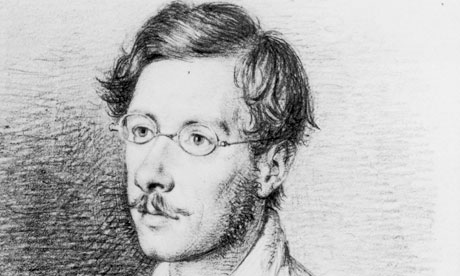
"Here come the next 12 months. A year Full of downturn and sobbing and fear and the nation's gloom thickens like a fog straight from Dickens but please don't forget Edward Lear!"
Next year the PR-driven Dickens machine is set to roll over us, reminding us how well off we really are compared with unfortunate Victorians. But instead of the Dickens bicentenary, let's remember Edward Lear on the eve of his own.
Lear is known mainly for his limericks and for that absurdist/surrealist epic The Owl and the Pussycat; but he was a more rounded man of letters than a runcible spoon and a £5 note as a seaworthy vessel might suggest. He wrote and illustrated travel books that really deserve to be rediscovered, and harboured an ultimately unfulfilled ambition to illustrate the works of his hero Lord Tennyson; indeed, the house he lived in towards the end of his life was called Tennyson, which is like me calling my house Captain Beefheart.
The limericks are Lear's crowning glory, though; they could be lessons on how to live your life, or almanacs to consult before you set off out of the house – like you might look at the I Ching, or a pile of tea leaves in a china cup.
A lot of these Learmericks (a term I've just coined) have an odd shape for those of us brought up on the more usual version of the form: the last line is more or less the same as the first. They've got a circular, Zen-like quality that renders them less funny but more philosophical. Here are a couple of Leary examples:
"There was a young lady of Dorking / who bought a large bonnet for walking / its colour and size / so bedazzled her eyes / that she very soon went back to Dorking." (This may be the first time Dorking has been mentioned twice in a poem.) And how about this one: "There was an old lady from Hull / who was chased by a virulent bull / but she seized on a spade / and called out 'Who's afraid?' / which distracted that virulent bull."
Note how the young lady from Dorking went out of her comfort zone in her large bonnet; perhaps she even walked as far as Reigate or Greatlee Wood, but because the bonnet was psychedelic and as big as a snooker table, she went home. If this isn't a fable about George Osborne abandoning plan A, then I don't know what is: the bonnet is the fiscal policy that seems huge and all-embracing but is, in the end, too much to bear. And the old lady from Hull is a great advert for mutual international co-operation. She didn't hit the bull with the great dull spade of a veto, did she? She distracted him with shouting and then (I think it's implied) had a long and meaningful discussion with him.
I hope that in 2012 we'll see union leaders and employers, together with MPs in select committees and international statesmen, toting their Lears as they go into their summits. There was a young man called Obama? That strong and decisive Sarkozy? The geezer some people call Clegg? A limerick can render a leader more accessible and less able to pull the wool over your eyes (unless, of course, they do it as a surprise while serving you scrumptious mince pies).
And how about: "The recession they call double dip / gives a tremble to Cameron's lip / all this cutting and pain / should have led to more gain / not a stagger, a stumble, a slip?" Or: "The young lad who lived in a tent / who cared just how the money was spent / he told all the hacks / of his concerns on tax / that young thinker who lived in a tent."
Somehow the limerick, particularly in this Lear-ish style, can distil thought into something manageable and graspable and thereby open up discussion and debate; it's a vital form for our threadbare times. And you can't get Great Expectations in five lines.

